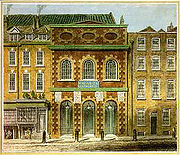- Restoration Comedy
-
 Charles II. war ein Liebhaber der englischen Restaurationskomödien
Charles II. war ein Liebhaber der englischen RestaurationskomödienAls Restaurationskomödien bezeichnet man die englischen Komödien der Restaurationszeit. Sie entstanden ab 1660, nachdem nach 18 Jahren des Verbots wieder öffentliche Theateraufführungen erlaubt wurden. Die Wiedereröffnung der Theater ging einher mit einem Wandel der aufgeführten Stücke und der Aufführungspraxis. Die Restaurationskomödien waren sexuell sehr freizügig, was sowohl durch König Charles II. persönlich als auch durch die Freizügigkeit seines Hofes gefördert wurde. Die Blütezeit der Restaurationskomödie endete um 1700, als moralische Bedenken und ein gewandelter Publikumsgeschmack zu ihrem Niedergang führten.
Autoren
Zu den wichtigsten Autoren der Restaurationskomödie gehören Charles Sedley, John Dryden, William Wycherley, George Etherege, Aphra Behn (die erste professionelle britische Dramatikerin), Thomas Shadwell, Thomas Southerne und ab den 1690er Jahren William Congreve und John Vanbrugh.
Aufführungspraxis
Die Aufführungen zogen ein großes Publikum aus allen sozialen Klassen an und zeichneten sich aus durch Bezüge auf das Zeitgeschehen, lebhafte Handlungen und die ersten professionellen Darstellerinnen. Bis zu diesem Zeitpunkt waren weibliche Rollen ausnahmslos durch Männer dargestellt worden.
Sogenannte Hosenrollen waren Bestandteil von fast einem Viertel der in der Restaurationszeit geschriebenen Komödien. In diesen Hosenrollen erschienen die Schauspielerinnen in männlicher Bekleidung auf der Bühne – sie trugen die enganliegenden, bis zum Knie reichenden Hosen, die die Standardbekleidung ihrer männlichen Zeitgenossen waren. Meist stellten sie schlagfertige Frauen dar, die sich aus irgendeinem Grund als Mann zu verkleiden hatten oder die Dinge tun wollten, die nur einem Mann offenstanden.
Zu den erfolgreichen Schauspielern und Schauspielerinnen dieser Zeit gehörten Nell Gwynn, die Geliebte von Charles II., Elizabeth Barry, Anne Bracegirdle, Thomas Betterton und Colley Cibber.
Kritik
Zu den wichtigsten Kritikern der Restaurationskomödie gehört Jeremy Collier, der sie in seiner Schrift A Short View of the Immorality and Profaneness of the English Stage von 1698 heftig angriff. Als Beispiel für seinen Vorwurf der Unsittlichkeit und Gottlosigkeit bediente er sich vor allem der Komödien Congreves und Varbrughs.
Wikimedia Foundation.

